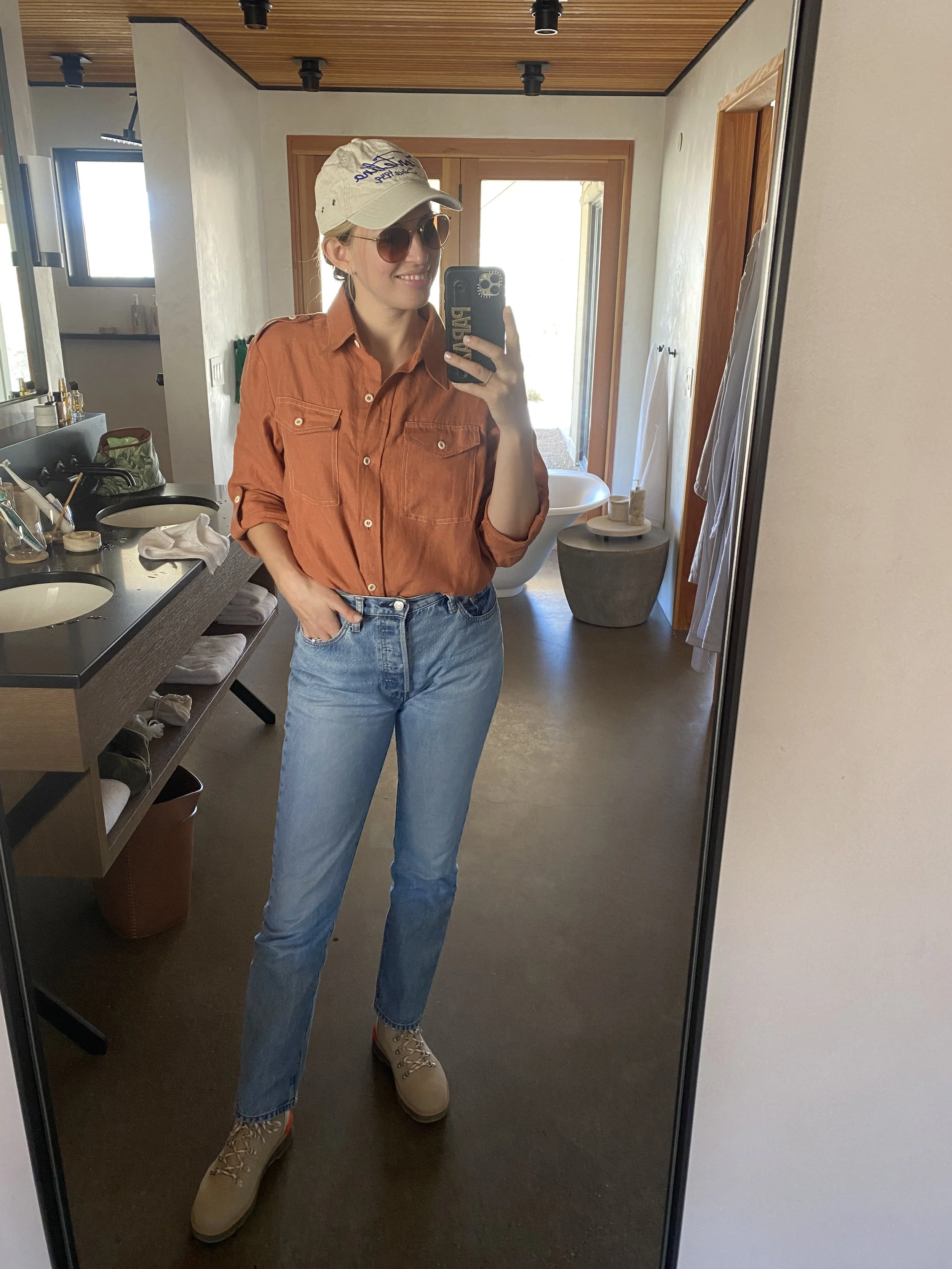THE PERFECT JEANS
Jeans are a base garment in many wardrobes but, unfortunately, they come with a high environmental footprint. The denim is made from cotton that requires an enormous amount of water to grow and uses hazardous chemicals for the colour dying process. So how can we find jeans that not only fits us perfectly but the environment too?
Isabella at Amangiri, wearing her Levi’s 501 and Oramai’s organic linen shirt.
Let's start by the fit. After having bought two pairs of too baggy jeans, I decided whilst in New York to give jeans-fitting a real go. Entering enthusiastically into Frame, the go-to brand for anyone inspired by our fashion director Julia Sarr-Jamois x Frame latest limited edition collaboration. Sadly I soon came to realise that trying on jeans actually is a very demoralising experience. Thinking you are one size and once you have managed to squeeze into a pair only to realise you can't actually zip them up - isn’t the best confidence booster. On top of having a very sweet but too understanding shop-assistant trying to help you by simply knowing better, just made the situation worse which in this case ended up with me storming out of the store. Sorry! It's me not you… So I happily discovered the rather peaceful experience by sitting at home in the harmony of not only my own thoughts but my own comfort, with a measuring tape at hand and free returns.
The Crystal Slouchy Straight Leg Jean was handcrafted for 120 hours & adorned with over 50,000 Swarovski crystals.
What about the cut? Striving towards a ‘less is more’ mindful-focused wardrobe I figured the perfect jeans is something that works for every occasion. The history of jeans actually started in 1873, by an innovation in workwear by Levi Strauss and Jacob Davis that patented their riveted work pants that kept the pocket and seams from bursting when doing heavy work. This conjured one of the most iconic fashion items ever: the Levi’s 501 jean. Surely this cut must be a winner as it is today, celebrating its 150th anniversary, the 501 endures as the greatest story ever worn, beloved by millions of people worldwide.
Hailey Bieber Fronts the Levi’s 501 campaign.
“Whatever happened, it happened perfectly right,” notes legendary stylist Tonne Goodman of the development of the 501. “It’s the standard, a garment that simply works. In so many ways, and on so many kinds of people.” Goodman herself is proof of the versatility – and trend-immunity – of the Levi’s 501: for decades, the American Vogue sustainability editor has made the white 501s part of her uniform, dressing pairs up or down as occasion demands. “The cut is ideal, and what I especially love is the way the jeans get worn in, so they really belong to you.”
Tonne Goodman in her Levi’s.
Concerning the material? Researching about this iconic denim however I found that it was quite a dirty business. Denim is made of cotton. More than 90% of that cotton is now genetically modified, using vast amounts of water as well as chemicals. Cotton production is now responsible for 18% of worldwide pesticide use and 25% of total insecticide use. The largely untested impacts of these chemicals on both the land and human health is a worrying situation as mentioned in Livia Firth's worthwhile documentary; ‘The True Cost’ l. Amy Powney, creative director of Mother of Pearl also states in her latest documentary ‘Fashion reimagined’, that 5 of the top 7 cotton producers uses child labour. So let’s search for an organic one.
How about the colour? Levi’s has been working on its iconic 501s to receive an eco-friendly overhaul by working on a true circularity to their main line, states Paul Dillinger, Levi’s vice president of global product innovation, recently in a Vogue interview. The new 501s are made from a blend of organic cotton, sustainably-sourced wood pulp and Circulose – made by Swedish company Renewcell that is focusing on circularity by recycling cotton textile waste. The dyeing process of jeans is another famous eco thieve by its use of hazardous chemicals to create that washed blue look we have come to cherish. At Levi’s this is another area that needs improvement, currently the jeans don’t use any chemicals on the Zero Discharge Of Hazardous Chemicals’s manufacturing restricted substance list, but Levi’s is now exploring to pilot the use of plant-based indigo.
Regarding vintage? Another way to find those perfect jeans is to dig into the archives and go and find those already perfectly worn-in vintage ones. Head to a fabulous carbootsale like the upcoming one in Selfridges Car Park in London on Saturday, 20th May hosted by Women for Women or head to vintage stores like Retro Woman / Man in Notting Hill to hunt for those original ones.
To my choice. Sustainability is a mindset which makes it possible for everyone to join. Even though it was not the greenest option out there, more regenerative ones in the shopping guide but for me, I was sold. I aim to buy less but it will last longer and in this case I hope that the 501 will continue to flourish not only in my outfit choices but in the world in an ever evolving greener way. Upon arrival; they fitted perfectly - my tip is to really take time to measure carefully so your size is the right one.
Isabella behind the scenes at a Vogue photoshoot, photocredit Kofi Paintsil. Wearing organic cotton Ninety percent T-shirt and up-cycled Chloé Nama Sneakers.
JEANS SHOPPING GUIDE
Cut from a blend of GOTS-certified organic and recycled cotton, are the result of Raey's pursuit of eco-conscious processes.
£160
They're cut from blue denim that's been washed for an authentic vintage look and have slightly cropped hems.
£245
A casual fit, they feature our gold kidney hardware on the waistband and gold rivets at the pockets.
£195
To this day they have never gone out of style and now made in a greener way.
£100
Whatever it is, the way you tell your story online can make all the difference.
£370
This jean is made from innovative fabric containing CIRCULOSE viscose and recycled cotton. It is finished using lower-impact washing techniques.
£34
These baggier style of organic cotton denim jeans are an alternative for a looser cut.
£240
The Row's 'Carlton' jeans are made from rigid, light-blue denim that's faded for a lived-in look.
£600
The 1997 jeans are crafted from rigid denim made of organically grown cotton.
£310
Go and find those 501 vintage perfectly worn-in jeans.
£32

















